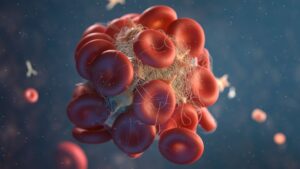
- RvT4 molecule shows potential in reversing inflammation and clearing blockages in blood vessels, benefiting rheumatoid arthritis patients.
- Research suggests RvT4 could lead to new treatments for conditions like atherosclerosis and obesity by enhancing macrophage function.
- Findings offer hope for improved longevity and health outcomes in RA patients and potential therapeutic avenues for related cardiovascular complications.
Researchers have identified a potential breakthrough in the treatment of blood vessel disease associated with rheumatoid arthritis (RA). A molecule called RvT4 has shown promise in reversing inflammation and clearing blockages in blood vessels, particularly in individuals with RA. By enhancing the biological activities of macrophages, RvT4 effectively reduces local inflammation and removes lipid build-up, addressing a key factor in the development of atherosclerosis.
RA patients face an increased risk of cardiovascular complications due to conditions like atherosclerosis, characterized by the build-up of plaque in artery walls. Studies on mice have revealed that administering RvT4 can reprogram macrophages, leading to the release of stored lipids that hinder their ability to reduce inflammation and clear blockages. This groundbreaking discovery not only sheds light on the underlying mechanisms of blood vessel disease in RA but also opens doors for potential new treatments to mitigate its incidence and severity.
Jesmond Dalli, Professor in Molecular Pharmacology at Queen Mary University of London, emphasized the significance of this finding, noting that restoring RvT4 production offers a mechanistic explanation for blood vessel inflammation in RA. Victoria King, Director of Funding and Impact at Barts Charity, echoed this sentiment, highlighting the potential of RvT4-based therapies to improve the longevity and well-being of RA patients. Furthermore, the implications extend beyond RA, as dysregulation of macrophage responses due to lipid accumulation is implicated in various other medical conditions, suggesting broader applications for RvT4-based treatments.














